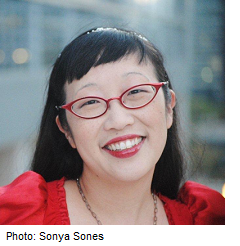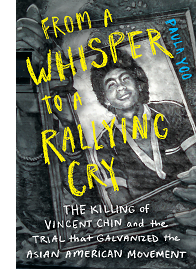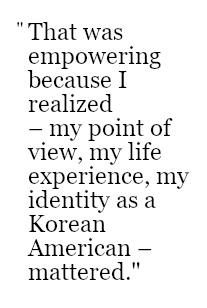


The homepage of Paula Yoo's website says, "The world is changing. Write like you mean it." And she is certainly doing just that.
Paula knew she wanted to be a writer since the first grade. She successfully accomplished that goal by becoming an accomplished journalist. From there, Paula has found success as a screenwriter for both movies and television, with credits for shows ranging from The West Wing to Supergirl. She is also an award-winning author. Her latest book, From a Whisper to a Rallying Cry: The Killing of Vincent Chin and the Trial that Galvanized the Asian American Movement was just released.
*******************
What inspired you to write From a Whisper to a Rallying Cry: The Killing of Vincent Chin and the Trial that Galvanized the Asian American Movement?
I first heard about Vincent Chin in college when the Academy Award nominated Who Killed Vincent Chin? documentary by filmmakers Christine Choy and Renee Tajima-Peña came out. By the time I worked at The Detroit News from 1993-95, I was very aware of his story. Years later, when I left journalism to become a full-time book author and screenwriter, I thought the Vincent Chin case would make for a powerful screenplay. But as I tried to write it, I realized the story was so complex and nuanced that it would work best as a book.
How long did it take you to write it?
I had been researching Vincent Chin’s story on and off for several years out of personal interest. In 2018, I put all my research together and wrote a 90-page book proposal about his life and the federal court case. That book proposal took a few weeks to write and revise until it was ready to be submitted. To my surprise, the book sold just a few weeks after my book agent had submitted it to publishers. From there, I spent the next two years doing intensive research – in-person interviews, travel to Detroit, and visiting archives to read court transcripts and other research material. I then began writing the book in early 2019. I finished the first draft in October 2019. From there, it was several rounds of revisions for the line edit and copy-editing stages in 2020 before its publication date of April 20, 2021.
 Vincent
Chin’s story is certainly difficult to read about, how did it
affect you as you researched and wrote the book?
Vincent
Chin’s story is certainly difficult to read about, how did it
affect you as you researched and wrote the book?
I had been a journalist for many years before making the transition to full-time writing for books and screenplays (TV and film). So that earlier training helped me focus and compartmentalize my emotions over the brutal violence of the crime and its tragic aftermath. My logical journalist side wanted to make sure I presented a thorough, meticulous and fair account of what happened. But what surprised me the most was how everyone I interviewed shed tears during our conversations. Even though Vincent had died almost 40 years ago, many people I interviewed cried as if he had just died yesterday. I couldn’t help but also tear up. I realized what a profound and lasting traumatic effect his death had on those closest to him — they were not just remembering what happened back then. They were reliving the past. It was an honor and privilege to hear their stories.
What do you hope people take away from reading From a Whisper to a Rallying Cry: The Killing of Vincent Chin and the Trial that Galvanized the Asian American Movement, especially given the current spike in violence against AAPIs?
There was a recent statistic about how one out of four AAPI teenagers have reported experiencing anti-Asian verbal or physical harassment and bullying due to the COVID-19 pandemic. That breaks my heart. This is why my book is specifically geared towards high school students, because I want this history to be taught in schools. The more we know about AAPI history – our voices, our stories, our histories, our contributions – the more that knowledge and education will humanize us and prevent history from repeating itself again.
What is the writing process like for you? Do you set aside certain hours in the day or is it more when the moment strikes?
As a violinist, I grew up having to practice several hours a day for recitals, orchestra concerts and competitions. I was used to warming up with scales and etudes before studying a new sonata or concerto. I would then also make sure to have fun while I practiced by allowing myself a little bit of time at the end of my session to play a favorite piece or improvise along to a favorite rock song off the radio! So I use that same approach with my writing because as a full-time working book author and screenwriter. I’m often juggling several deadlines for different projects at once, so I can’t afford to just “wing it.” I have to schedule ahead of time what I plan to work on. So I usually “warm up” by catching up on writing-related email correspondence (with my editor, agent, and if I’m on a script deadline, with my agents or the producers/executives I’m working with). I then read whatever I wrote before and/or take care of revision work as well. Then I usually have already scheduled what I plan to write next. It ranges from working on a new chapter or section of a book or a sequence of new scenes for a script. Then I always allow myself to have fun by brainstorming fun passion project-type ideas! (One day… I will write that cat novel based on my three cats! LOL!) Sometimes, I am working full-time as a TV writer/producer on a show. So that’s always the hardest time for me because I’m juggling a full-time TV job on top of working on my own separate book/script projects.
Now, having said that, my good intentions often go awry. There are days when I am unable to write anything because I’m frustrated or “stuck.” And yes, I procrastinate! So when the writing does not “flow,” I will just walk away from my desk and do something non-writing wise, like listen to music, play my violin for fun, or play with the cats or call a friend to chat or play video games etc. (I’m especially into puzzle games like The Room on my iPad, as well as Solitaire, word games, and fake poker slots games!) Sometimes, I will read books and/or watch TV/movies to inspire myself because I believe you cannot write if you also do not read (or watch TV/movies as a screenwriter). These non-writing days can be frustrating, but I never lose hope because I know it means my subconscious is figuring out a knotty writing problem. And then… the next day, I wake up refreshed and usually that’s the day I can finally get some writing done. So I never expect to write every day. But I at least try to write every day.
 You've written screenplays, children's books, young
adult novels, non-fiction books, and newspaper articles. Is there
one genre that you enjoy writing in more than the others?
You've written screenplays, children's books, young
adult novels, non-fiction books, and newspaper articles. Is there
one genre that you enjoy writing in more than the others?
The reason I write in so many different genres is because not all stories/ideas are meant to be written in one genre. Whenever I am brainstorming a new idea, I am also figuring out what is the best way to tell that story. Not all novels make for great screenplays, and not all screenplays make for great novels. Sometimes a non-fiction idea works better as a newspaper or magazine feature story, and sometimes a non-fiction idea must be told in a longer book format due to the topic’s complexity. Having said that, my heart belongs to the novel. That is my favorite genre to write because I feel it combines all the different genres I love in one pure and beautiful format. In fact, as a musician, even though I love and play all different types of music (from classical to rock to country to hip hop and jazz), my favorite musical format is the classical symphony. I think a symphony is the novel of music.
Many of your books are about or include Asian/Asian American figures and characters. Was that something you have always planned on doing since becoming a writer?
I wanted to become a writer after I read Charlotte’s Web in the first grade. I used to write short stories and little books all throughout school. I even submitted my first “novel” in the second grade to Harper & Row (which would later become HarperCollins)! I received a nice letter from the publisher saying I was a talented writer and that I should submit a story to their annual children’s writing contest for child writers aged 7-10. I immediately ripped up the letter and cried that I was not a “child” writer but a “real” writer! Obviously, I was not good at handling rejection back then!
After majoring in English in college, I felt I was too young and inexperienced to write “the Great American novel” which is why I pursued journalism instead. When I did daydream about writing my first novel, I never quite knew what to write about because there were so few books published back then by and about Asian Americans. So I started writing short stories and half-attempted novels in college and in my early ‘20s featuring white characters. As a result, my writing, although technically proficient, always felt a bit “generic” and emotionally distant. And then one day, I was inspired to write a funny short autobiographical story about a bad orchestra audition I had in high school. Before I knew it, it was 4 AM! I had been writing all night! That short story would become my first published YA novel Good Enough… published by HarperCollins, decades after they rejected my first novel in the 2nd grade! That was empowering because I realized – my point of view, my life experience, my identity as a Korean American – mattered.
Is there a piece of advice you were given that you didn't follow and are glad you didn't?
Quitting. I grew up learning that you should never quit. You should always persist and never give up! Although that is very inspirational advice, I’m glad I also ignored that advice at certain times in my life. There have been a few rare times when I did quit and walk away. I learned there is no shame in leaving a toxic work environment to protect yourself. I learned that abandoning a writing project is sometimes necessary because that project was flawed from the start and would ultimately be a heartbreaking waste of time. Sometimes you have to walk away in order to discover a more productive – and positive – path.
You are both a published
author and a professional violinist. If you had to choose, would
you be a writer or a violinist?
For me, writing and playing the violin are both creative forms of
storytelling and communication. I write to say what’s on my mind. I
play the violin to show what’s in my heart. Words and music are the
same thing to me, so I can’t make a choice!

‘Press 1 for English’: Vaccination Sign-Ups Prove
Daunting for Speakers of Other Languages
by Rachana Pradhan
Famous Firsts of Asian
American Women
How to Report
Hate Crimes Against AAPIs
Learn More: What Others Are
Saying
JADE Pieces: Great Gifts for
Moms and Grads
Who, What, Where and How: AAPI Organizations